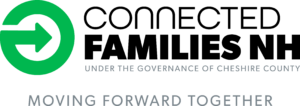Some of the main hardships that Lisa pinpointed to their CFNH care coordinator included defiance, talking back, and an unwillingness to engage within the home. Alex’s behavior was also affecting his schooling, and his grades warranted a call from his school principal because he was in danger of failing his school grade completely.
Having been diagnosed with attention deficit hyperactivity disorder (ADHD) and oppositional defiant disorder (ODD) shortly before entering the FAST Forward program, our care coordinators were careful to continually remind Alex that he himself was not “the issue,” but rather his situation was a hurdle to be taken with the support of their family, and community. Connected Families NH introduced Alex to a peer support specialist, that is another youth who has struggled with similar situations and was able to turn things around through the CFNH FAST Forward program. Through this program, and the support of their peer support specialist, Alex began to become more receptive to the program and was more willing to engage with his care coordinator and his dedicated team.
Alex and Lisa’s situation was multifaceted, and after identifying their needs as a family and individually, their personal care team devised a care plan that aimed to help them achieve their identified goals. Because Alex struggled with authority and had a hard time staying focused, our team structured his progress meetings in a way that empowered him to take ownership of his time and encouraged him to participate in positive leadership.
After about three months, Lisa began to see vast positive changes in her son. Through the FAST Forward program, Alex received counseling and medication from licensed mental health professionals, which helped him manage impulsive, negative thoughts and behaviors. Through the program, Lisa and Alex were able to undergo cognitive behavioral therapy (CBT), motivational interviewing therapy, positive/negative reinforcement exercises, and other evidence-based techniques. Since graduating from the FAST Forward program, Alex has stayed out of trouble and is doing much better in school. Alex and Lisa’s relationship is much stronger, and they both practice more patience and understanding when it comes to communicating.
Overall, the success of an intervention for teens depends predominantly on two things: the professional strength of a treatment program and the committed involvement of the family, both of which were present in the case of Lisa and her son, Alex.
About Connected Families NH
Funded by a grant from the Substance Abuse and Mental Health Services Administration and contracted by the Bureau for Children’s Behavioral Health within New Hampshire’s Department of Health and Human Services, Connected Families NH is a collaborative family-led program designed to improve the emotional health of children and young adults. We recognize the importance of emotional health and provide free, flexible services and support through our statewide and regional programs. Reach out or submit a referral to learn more about how Connected Families NH can help you. Connected Families NH is under the governance of Cheshire County. Connected Families NH is not an emergency service. If you or someone you care about is having a mental health or substance use crisis, you can call and speak to trained care staff at the NH Rapid Response Access Point at 833-710-6477 or 988 or NH988.com.
